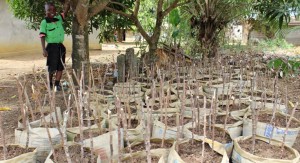Crops from a bag-developing Urban Agriculture
Water greens, collard greens, pepper, you name it! Most vegetables that are needed to keep the pot boiling in Liberia, can be grown at any backyard. Anyone can do urban agriculture, if they are just taught how to do it.
With help of Project New Outlook (PNO) – a local partner of Finn Church Aid (FCA) – women in urban and peri-urban communities have learned a new way for cultivating all year round in Paynesville area, close to the capital of Liberia. The urban agriculture project is based on use of old cement bags. The beneficiaries of the project are given empty cement bags, which they fill with fertile soil. Cement bags are of strong material and ideal size for planting and growing small crops of vegetables. Sowing the seeds and taking good care of the bag-garden is not difficult.
Better nutrition and extra income
Before being introduced to Urban Agriculture project, Martha Togba and her family earned their living by producing and selling cassava, charcoal and palm wine. Having learnt the new technique of planting in a bag, Mrs. Togba has become enthusiastic about her garden. Learning to cultivate new and more valuable vegetables provides better nutrition to the family and brings some extra income.
“We produce for example string beans, different kinds of peppers and cabbages. Water greens and string beans are valuable in the market, so we go and sell them,” Mrs. Togba tells and shows around her backyard garden. “Now I am concentrating in producing seeds, so that we can then plant the next crops.”
Innovative solution to fight extreme weathers
But why would anyone plant in a bag in Liberia, while most families in a peri-urban setting have plenty of space? There are many challenges to effective vegetable farming. In West Africa the weather conditions are extreme. Rainy season does not mean just occasional rains, but the intensity of rainfall makes Monrovia the rainiest capital in the world. No wonder that in lowlands the soil turns into mud. On the other hand, during dry season the soil gets even too dry in the highlands. During that time, adequate soil for cultivation can be found only in the swamp areas.
Sowing in bags which are filled with fertile soil is the best way to make sure the rough weather conditions will not harm the crops. Even heavy rains cannot take the nutrients away, and it is easy to move the bags to get rid of extra water. Draught does not bother the bag-garden either, as long as sufficient watering is taken care of. Bags can be moved from one place to another, in search for the ideal weather conditions.
“We are providing equipment and technical support. Now, having better seeds and better practices, these peri-urban farmers can produce more vegetables than before. And what is best, they get crops also during rainy season,” Finn Church Aid Program Coordinator Emmanuel Sandi tells.
PNO and FCA have supported 146 vulnerable families in seven communities to develop their agricultural skills and techniques since November 2011, when the project started. About 85 % of projects’ beneficiaries successfully cultivated various vegetables and earned income instead of suspending cultivation during the rainy season. The PNO-FCA cooperation has also been successful in initiating the revitalization of the local egg production.
Text and photos: Ulla Tarkka
